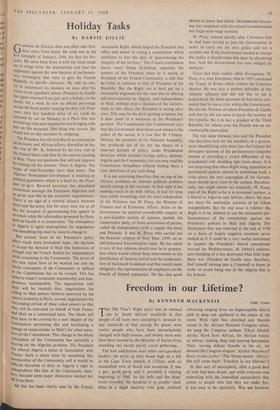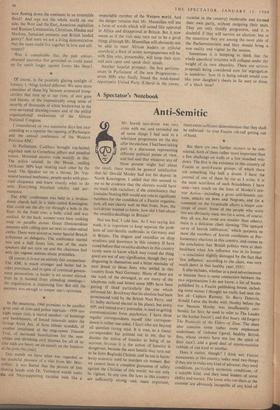Freedom in our Lifetime?
By KENNETH MACKENZIE CAPE TOWN
THE Old Year's Night party was an unusual one by South African standards in that people of all races were 'attending it; unusual by any standards. in that among the guests were twelve people who have been inconclusively charged with high treason, and twenty more who have been banned by the Minister of Justice from attending any except purely social gatherings.
The host and hostess were white anti-apartheid leaders; the party, at their house high on a hill in the Cape Town suburb of Clifton, with an unequalled view of beach and mountain. It was a gay, good party and it provided a rousing beginning to 1960. As the bells and the ships' sirens sounded, the hundred or so people—dark skins in a slight majority over pale, political colouring ranging from an imperceptible liberal pink to deep red—gathered in the centre of the room. With right fists clenched and thumbs raised in the African National Congress salute, we sang the Congress anthem 'Nkosi Sikelele Afrika' (God Save Africa), the African voices, as always, making deep and moving harmonies. Then, waving defiant thumbs in the air, we shouted the Congress slogans: 'Afrika! Mayibuyel Kuizi lxesha Lethal' (The Xhosa means: `Africa! She will come back! Freedom in our lifetime!') In that sort of atmosphere, after a good deal of wine had been drunk, and while everyone was embracing 'with the intensified camaraderie that comes to people who feel they are under fire, it was easy to be optimistic. Was not freedom now flowing down the continent in an irresistible flood? And was not the whole world on our side, the West and the East,, American capitalists and Russian Communists, Christians, Hindus and Muslims, Jamaican peasants and British landed gentry? And were we not a living demonstration that the races could live together in love and self- respect?
Was it conceivable that the pale colour- obsessed neurotics that governed us could stand up for much longer against forces like these?
* Of course, in the painfully glaring sunlight of January 1, things looked different.. We were more conscious of those big Saracen armoured troop- carriers that turn up at our riots, of sten guns and batons, of the impenetrably smug sense of security of thousands of white hou'sewives in the over-servanted drawing-rooms and of the pitiful organisational weaknesses of the African National Congress.
I remembered on two successive days last year attending as a reporter the opening of Parliament and the annual conference of the Western Province ANC.
At Parliament, Cadillacs brought top-hatted, dignified men to Corinthian pillars and panelled rooms. Mounted escorts rode smartly in line. The police saluted. In the House, smiling Afrikaner MPs kept shaking each other by the hand. The Speaker sat on a throne, Dr. Ver- woerd beamed bonhomie, people spoke with prac- tised eloquence and knew exactly what to do next. Everything breathed solidity and per- manence.
The ANC conference was held in a broken- down church hall in a slum called Kensington. One could see the dry rot through a hole in the floor. In the front row, a baby cried and was suckled. At the back, women were busy cooking soup on paraffin stoves. Great Dostoievskian peasants with rolling eyes sat next to sober-suited clerks. There were almost as many Special Branch policemen as delegates. The conference started two and a half hours late, one of the main speakers did not turn up and the chairman had only the vaguest notions about procedure.
Of course, it is not an entirely fair comparison. The ANC is much stronger and better led in other provinces. and in spite of continual govern- ment persecution--a leader is no sooner elected than he is banned from attending meetings— the organisation is improving fast. But still the memory was enough to temper one's optimism.
* In the meantime, 1960 promises to be another, grim year of riots and police reprisals--l959 saw eight major riots, a record number—of bannings and banishments, of forced removals under the Group Areas Act, of farm labour scandals, of another instalment of the tragi-comic Treason of increased humiliations for the non- whites and shrinking civil liberties for all of us (the odds are heavy on an assault on the freedom of the press this year).
This month we have what was regarded as the doubtful pleasure of a visit from Mr. Mac- millan: it was feared that the picture of him shaking hands with Dr. Verwoerd would make the old Nazi-supporting racialist look like a respectable member of the Western world. And the danger remains that Mr. Macmillan will use a form of words which will sound like approval in Africa and disapproval in Britain. But it now seems as if the visit may turn out to be a goad thing; although Mr. Macmillan will obviously not be able to meet African leaders or criticise apartheid, a flock of senior newspapermen will be with him who, presumably, will keep their eyes and ears open and speak their minds.
Another hopeful prospect: the first perform- ances in Parliament of the new Progressives— seven MPs who finally found the weak-kneed opportunist United Party (Liberal in the towns, racialist in the country) intolerable and formed their own party, without resigning their seats. They are only timidly progressive, and it is doubtful if they will survive an election; but in the meantime they are among the most able of the Parliamentarians and they should bring a new reality and vigour to the session.
Sometimes it is tempting to think that the whole apartheid structure will collapse under the weight of its own absurdity. There are serious proposals being considered now for segregation in laundries: how (it is being asked) would you like your daughter's sheets to lie next to those of a black man?



































 Previous page
Previous page